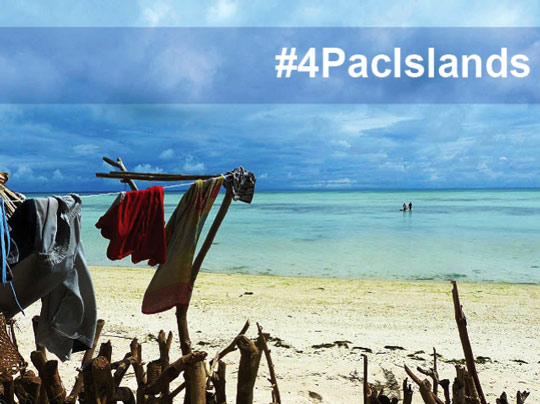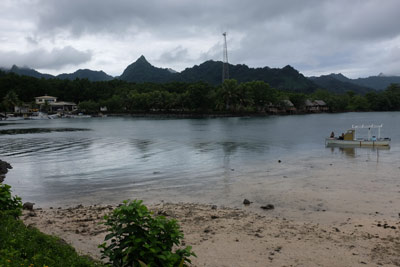
APIA (Secretariat of the Pacific Regional Environment Programme / The Fiji Times / Pacific Media Watch): With just a few weeks to go until the COP21 (United Nations Framework Convention on Climate Change) in Paris begins, the Secretariat of the Pacific Regional Environment Programme (SPREP), along with other regional groups, have launched a social media campaign this week using #4PacIslands.
The aim is that online communities will learn more about the impacts of climate change as well as the actions that Pacific Islanders are undertaking as they adapt to the effects experienced.
The project, "Pacific Voyage to COP21", will see a range of social media messages released through Facebook, Twitter and other platforms, using #4PacIslands on a regular basis as the world counts down to the conference.
"We in the Pacific Islands understand and know all too well the impacts of climate change and that Pacific Island communities are implementing actions to adapt to these effects as well as to mitigate climate change where we can with support from our partners," said SPREP Director-General David Sheppard.
"What we call upon now is your support to share these stories of both climate impact and climate action with people around the world by sharing our online messages and by using the #4PacIslands tag."
Appeal for support
Endorsing the joint social media campaign, the Secretariat of the Pacific Community (SPC) Director-General, Colin Tukuitonga, appealed for widespread public support to help have Pacific voices heard at the UN Climate Conference in Paris and beyond.
"Climate change is a real and important threat to the livelihoods and sustainable development of Pacific people and it's imperative for us to have the Pacific perspective echoing in Paris and around the world," Tukuitonga said.
"We're committed to joining with our partners to raise the visibility of the climate crisis in the Pacific and the concerted and urgent actions needed to address them," he added.
Social media platform
The Secretary-General of the Pacific Islands Forum Secretariat, Dame Meg Taylor, said: "The Pacific region and our Small Island Developing States in particular, face enormous challenges due to the effects of climate change. An ambitious and legally binding agreement from the COP21 meeting that demonstrates care and compassion for the most vulnerable is of the utmost importance."
"This campaign provides a platform for you to raise your voice alongside the millions of Pacific Islanders who wish for a bright and prosperous future; a future that will not be possible for many without substantial and lasting commitments to change."
The University of the South Pacific also reiterated the call to Pacific Islanders in support of the social media campaign that would help the Pacific negotiators in Paris.
"Social media is a powerful tool and will help highlight to the world, what the Pacific is fighting for in Paris and how that will affect the smallest communities in our large ocean states," said Professor Elisabeth Holland, director of the Pacific Centre for Environment and Sustainable Development (PaCE-SD) at USP.
The Pacific Islands contribute to less than 0.03 percent to the world's total greenhouse gases yet are among the most vulnerable to the impacts of climate change, for them the outcomes of COP21 are crucial.
Problems in the FSM
But as support for COP 21 is gathering, people of the Federated States of Micronesia (FSM) have been asked to start moving inland.
With 607 islands, of which only a few have high ground, FSM's National Disaster Management Office is advising people living close to the coastlines to move inland or to high grounds.
The Fiji Times reported the FSM's representative from the State Emergency Operation Centre, who attended the Pacific Regional Disaster Resilience meeting in Suva last week, Nena William, said this was the only way they could address the issue of climate change as they continued to fear losing more land to the ocean.
"I guess we're experiencing the same like any other island in the region. There's been a lot of over wash or inundations, before we only get inundation during storms but lately even with the slightest rain that coincides with high tide brings inundation," William said.
He said this was the experience of those living on islands with high grounds so it would be worse for those on low lying islands.
Vulnerable islands
"FSM has 607 islands of which only small percentages are higher islands, most are lower islands and some are atolls, so majority of the islands are very much vulnerable to over wash, and storm surge.
"It's a small country. The areas are mostly water. We got one of the biggest fishing grounds in the region. If we look at sea level rise as an effect of climate change, the oceans will be getting bigger because the islands will be lost.
He also said we will eventually start to see the smallest islands disappear first, even the ones with mountains are experiencing a lot of salt water and inundation.
The problem of inundation was never there in the past, which was why majority of the people lived near the coast to support their livelihood, he said.
"We realise that it's too expensive to put up protection like sea walls and stuff, so we're more concentrated in encouraging people to build their infrastructures inland and away from the coast."
This work is licensed under a Creative Commons Attribution-NonCommercial 3.0 New Zealand Licence.




